A bit of my family history
All came from Omi, one of the most flourished merchant city in Japan
My great-grandparents originally came from Omi which always recalls merchant. All of my family members from my mother side were descended from Omi and my grandma and mom had to manage a business on their own pretty early in their lifetime.
When my grandma was a teenager, her father passed away. She was the oldest among all the children, so she took care of all the younger 3 sisters and 2 brothers with her mom while managing a business for 15 employees in 1940's.
My mom started managing her family business in early twenties
When my mom turned 23 years old her father suddenly lost consciousness, and he stayed rest of his life on the bed for 17 years after that.
He survived from the war, but the island he landed was the bloodiest battle fields — only 4 people survived and returned home to Japan out of a thousand — 0.4% survival rate. After he suddenly lost consciousness, he lost all controls to move his arms, legs, body, and even mouth. My grandma took care of him, and her oldest daughter, my mom took care of all the CEO job just as her mom did in her teenager. She drove to clients’ places all over in Kyoto whereas most of the sales people were still only male. It’s back in 1980's.
My grandma was busy taking care of her husband as he lost all of his body control, and my mom’s job was too overwhelming. All of her hair turned white before she turned 30 years old. Just too much stress for a young lady.
When I was walking with my mom, I remember all of my neighbors told my mom that “ah, did you get a grand kid?” and she was shocked every time when they told it to us.
“I can clearly tell that you’re not from a salarymen family”
Compared with my mom and my grandma, I‘ve been living much easier life.
I didn’t have to help the family business as they did, so my first working experience apart from any part-time jobs was the internship in Kenya.
Tried to contribute for women having HIV and their kids, but couldn’t help them much, and couldn’t build any sustainable business.
Many “interns” or “volunteers” end up with following the programs provided by the local organization, but I decided to build a project by myself since the other colleagues encouraged me to start something rather than following the path. I was 18 years old.
One thing I remember through the experience in Kenya was a message from one of the strongest supporters, “I can clearly tell that you’re not from a salaryman-family.”
After going back to Kyoto, everyone could see that I was working hard to send money to Kenya for some people dying because of some very simple diseases that could cure very easily in Japan. I was running out of cash, but couldn’t quit because I was hoping to help more.
My mom didn’t say anything about what I did, but she was always standing by me.
One day I saw an envelope in a mail box in my apartment. My mom didn’t write any sentences but wrote numbers. All the prizes, awards and financial contributions that I received from several Japanese organizations to build the project in Kenya, and all the expenses that I spent for it. The balance was zero.
Now I started my own business not because of “I wanted to become an entrepreneur!” or “my dream is to become a CEO.” As a staff at a public organization, everyone thinks all the information that I provide is free of charge. I did my best to reply, but the number of the messages was the way too much, and not many legal specialists could answer to the questions. Honestly I had nobody to rely on.
My over-working hours was easily exceeding 150 hours in a month, and when I found I was too dizzy to stand up by myself every morning, I decided to use my time efficiently rather than dealing with some internal political stuff that does not make any productivity and help any entrepreneurs.
Now I’m here.
It’s been 15 years since my grandma passed away. She worked until she went to heaven, and my memory about my grandma is always “a cool business woman”.
After I started going to abroad and my mom had some free time, she started a new business — selling hand-made bags at hand-craft markets in Kyoto. She’s working from Monday to Friday for the family business, and sewing bags on weekends.
I started my own business, and I take care of it on weekends while I work for some startups from Monday to Friday. Unlike working as a salaryman in a corporate, I don’t feel like I’m over-working as I’m always doing something meaningful for entrepreneurs now.
When we talk about entrepreneurship we tend to bring topics about stageA-B-C, IPO or investment, but we can start a business because people need it.
I think, starting business doesn’t have to be about scaling-up.
The famous catch phrase among Omi merchants is
三方よし:売り手よし、買い手よし、世間よし
Sanpo yoshi : Seller good, purchaser good, society good.
As long as people need the business, the sales will not go down.
Disrupting idea could make tons of profit and the publicity would be high, but these are not the definition of starting a business.
My family has such a small business. They rarely wear suit, they don’t go to a fancy office in a tall building, and they may not have much pension as the other retired salary men from big corporations,
but I’m thankful that they raised me and my sister until we graduated from schools, and still keep their business in 2020.
Thank you grandma, thank you mom!
